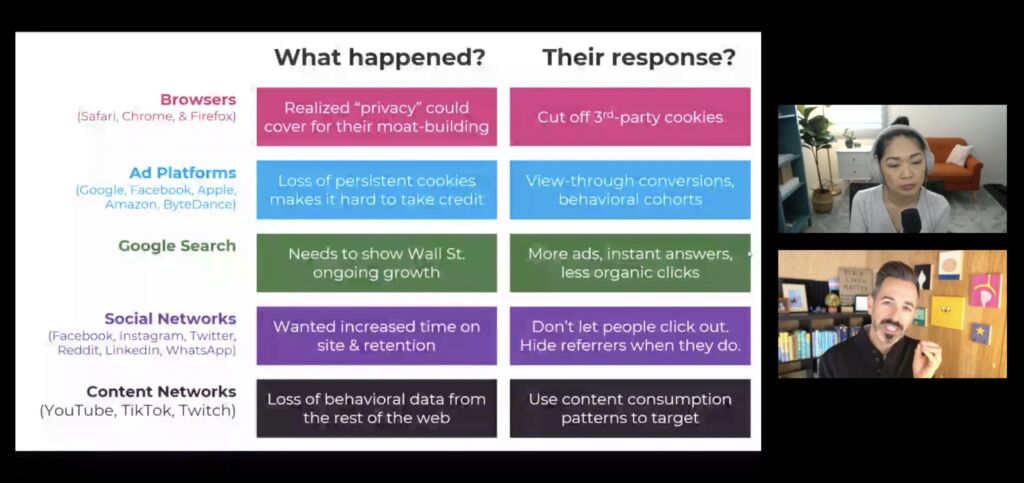Advertising online is changing. How will that affect organic search?
Targeting and Tracking.
Online advertising is all about presenting ads to users based on their behavior. Add to that cross-platform advertising – when ads follow you around the Internet – and you start to comprehend how advertising currently works online.
But things are changing.
The goal of The European Union’s General Data Protection Regulation (GDPR) ePrivacy Directive is to protect European citizens’ privacy and personal data. They have strict rules on how companies can collect, use, and share personal information. There is no federal privacy law in the U.S., but there are movements towards this both on state and national levels.
European data protection rules are prompting legal challenges and massive fines. As a result, enterprise companies like Facebook and Google will be ending the tracking of users across multiple platforms. An example of this change is Google Chrome phasing out third-party Cookies.
With no user tracking across multiple platforms, what are companies doing to keep their advertising dollars?

I recently attended an After Hours webinar by Sparktoro. The subject was The End of Marketing Attribution. In the video, co-owner Rand Fiskin and VP of Marketing Amanda Nativida discussed this movement and what platforms are doing about it. I encourage you to watch it here (1hr, 18min). The following is a summary of the video as I understood it.
Keeping users on their platform
Platform members have always been the most significant asset to advertisers. Since tracking users as they leave the platform is going away, external links are counter-productive to that goal. Google is a perfect example of this. Instead of providing links to websites, Google gathers the data from external sources and displays the answer inside its platform. While you are enjoying the results, Google is learning more about your likes and interests. The same is true of Facebook, Linked-in and most other platforms today.
The longer a user interacts with a platform, the more data the platform collects on that user. That data accumulates – unless the user chooses to opt out. The platform uses the data to create cohorts within the system – silos of unidentifiable users who have shown common interests. These cohorts will then be made available to advertisers within the platform, allowing them to promote their wares to anonymous groups interested in a particular subject.
What does this mean for organic search?
Organic search has always been the answer if you cannot support an advertising budget. Especially since soon, you will need one for each platform. These changes also mean that reaching new prospects via organic search is getting more complex. There are trends to battle this that are compelling. In future articles, I will dive into them.
Let’s Work Together
TELL ME MORE ABOUT YOUR PROJECT
One thing we learned over our 34+ years in business is that no two businesses are alike. Your business is as unique as you are. Let’s start with a conversation. No obligation. Just a desire to learn more and discuss how we might help you reach your objectives.






